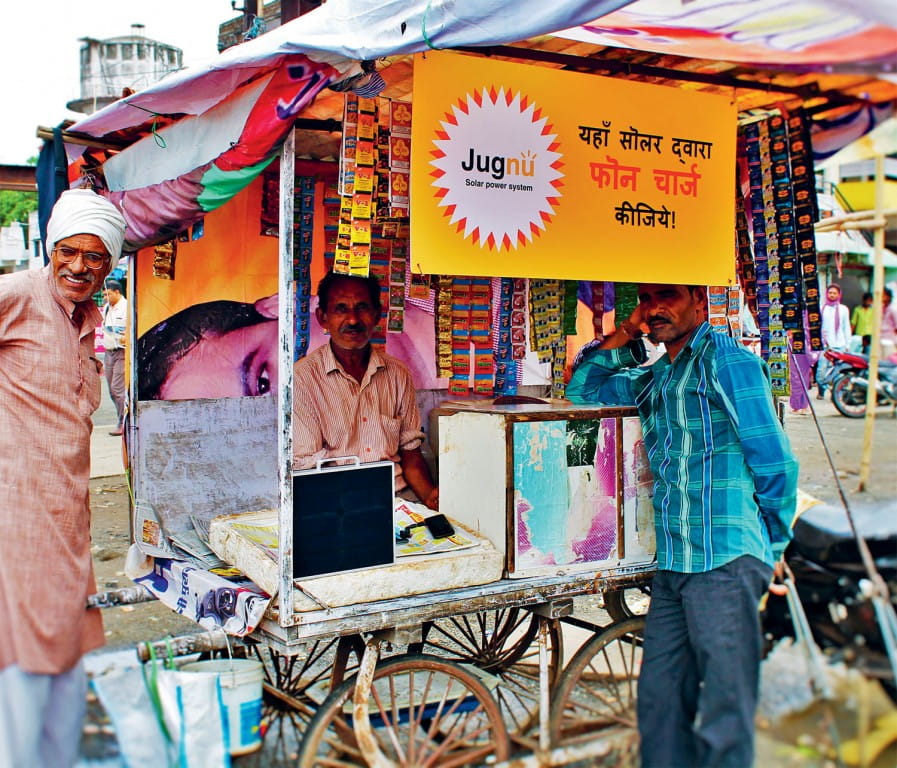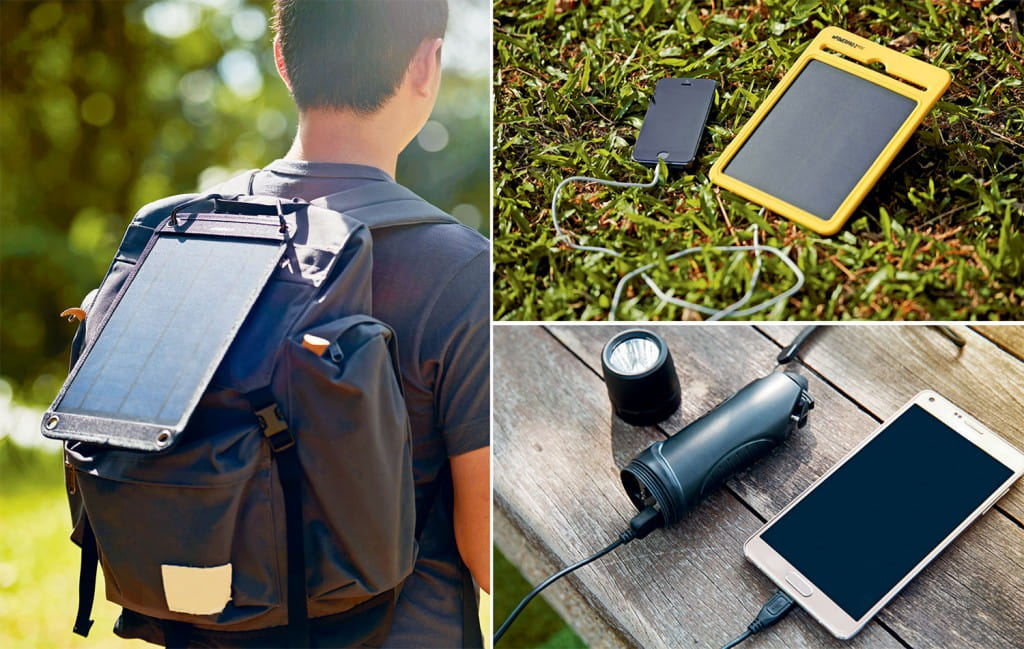
A solar panel sits on the cart of a street vendor, who is taking part in the Jugnu pilot scheme to sell portable solar energy to rural India.
Singapore-based Third Wave Power makes portable solar chargers that provide rural communities and outdoor enthusiasts with a sustainable energy source.
PHOTOS THIRD WAVE POWER
This is something that Singapore startup Third Wave Power, which specialises in sustainable energy solutions using solar power, hopes to change through a pilot scheme known as Jugnu (Hindi for “firefly”) that was launched in central India in August 2015.
VS Hariharan, co-founder and chief executive officer of Third Wave Power, says: “It came out of a lot of discussions over 10 to 12 months with social enterprises and consumers in the villages. We have done a limited pilot and the response has been positive.”
He hopes that Jugnu will address two key trends. The first is the lack of reliable power sources in rural India, where some households are not connected to the power grid and those that are often experience daily power outages. The second is the increasing mobile phone penetration rate in such areas, which has led to a corresponding increase in demand for power.
Under Jugnu, Third Wave Power sells solar power kits to local entrepreneurs in rural India for about US$50 (S$70) through a microfinancing scheme.
Each kit comes with a solar panel that charges five detachable power banks.
The entrepreneurs can rent out these power banks to rural consumers for five to 10 Indian rupee (10 to 20 cents) each. Aside from charging mobile devices, these power banks can also be connected to small fans and LED light bulbs to meet users’ other power needs.
Through these sustainable power sources, the start-up hopes that the people living in rural areas will be able to tap modern technology to enrich their lives.
Jugnu is but one aspect of the work of Third Wave Power, which was started in 2011 with the aim of improving lives and increasing productivity.
It is supported by incubator Small World Group, which mentors and provides seed funding to clean tech, optical systems and novel materials start-ups.
By combining sustainable energy with innovative technology, Third Wave Power produces a range of fast-charging and portable solar chargers that can be used in fieldwork, emergency situations, outdoor environments and rural programmes around the world.
Explaining its focus, Hariharan says: “We felt that there was a big opportunity in democratising power along with the proliferation of mobile phones, and solar power would be the best application here.”
MEETING DIVERSE NEEDS
Its products range from a lightweight solar kit to a tablet-sized, multi-functional power pack equipped with features such as a built-in reading light, an SOS signal, an FM radio and an ultrasonic insect repellent.
Depending on the size of the solar panels and the type of device, charging times vary – the larger the panels, the faster the charging time.
Through these sustainable power sources, the start-up hopes that the people living in rural areas will be able to tap modern technology to enrich their lives.
During natural disasters, its devices can also be used to run the mobile phones and laptops of aid organisations working in areas affected by power cuts, so that vital information on aid relief efforts can be relayed.
Besides products that leverage solar power, it also produces non-solar portable power solutions, such as card-sized power banks and highcapacity laptop chargers, based on market demand. Noting the Japanese population’s heightened sense of emergency readiness due to the prevalence of natural disasters such as earthquakes and tsunamis, the company launched the mPowerflash emergency kit in Japan in November 2015. Containing a rechargeable flashlight and a power bank with built-in emergency tools, such as a windshield breaker and a seatbelt cutter, it will be sold in North America too.
Companies conducting research in locations that lack adequate power sources can also use its technology.

FROM LEFT: The mPowerpad 2 Go charges quickly under the sun. RIGHT TOP: Third Wave Power produces a range of portable solar chargers such as the palm-sized mPowerpad 2 Mini. RIGHT BOTTOM: The mPowerfl ash emergency kit is designed to be used in emergency situations.
A Singapore-based smart agriculture solutions company is relying on Third Wave Power’s solar chargers to power its data collection application on a plantation in Indonesia.
On the developmental front, the company also works with various social enterprises to address energy needs in rural communities. It has partnered The Goodwater Company to enable those living in rural parts of Indonesia to have access to sustainable energy solutions, bringing power to people where it matters and is needed most.
It is also exploring opportunities to develop wearable products and the wireless charging of devices, says Hariharan. It hopes to promote the use of its solar chargers among urbanites, including those in tropical Singapore, to meet part of their energy needs.
He adds: “We are trying to create a portfolio of products that will be useful even in geographies where electricity is readily available.
We hope to combine the desire to be environmentally friendly with the availability of affordable products that can also be charged using solar power.”
